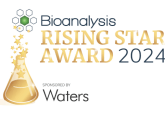Top tips for PhD applications: an interview with Melanie Bailey

Now that university results have been released and graduation ceremonies are underway, what is next?
If you are choosing to continue your education after taking a Master’s degree, you may be interested in submitting your application for a PhD degree. To help further the careers of bioanalysts just starting out within the field, Bioanalysis Zone has reached out to Melanie Bailey from the University of Surrey (UK) to get her insights and top tips on drafting a PhD application.
 Melanie Bailey
Melanie Bailey
Director, BBSRC SEISMIC facility for spatially resolved single and sub-cellular ‘omics’, EPSRC & Professorial Research Fellow
School of Chemistry and Chemical Engineering, University of Surrey (UK)
Dr Melanie Bailey is a Professor of Chemistry at the University of Surrey and is currently working on an EPSRC-funded fellowship. She obtained her BSc in Physics in 2001 from the University of Manchester (UK) and her PhD in Electrical Engineering from the University of Surrey Ion Beam Centre (UK) in 2005. Dr Bailey was an Ion Beam Analysis Liaison Fellow for the Surrey Ion Beam Centre from 2007 until 2011, where she worked with users of the facility to gain high-resolution trace element maps and profiles. During this time, she began working with various law enforcement agencies to develop ion beam analysis methods in forensics and has worked as a consultant for the International Atomic Energy Agency to set up a globally coordinated research program on nuclear techniques in forensics.
Dr Bailey joined the Department of Chemistry in 2011 to lecture in forensic science.
How has the typical PhD applicant changed within the last 5 years?
That’s an interesting question. The pandemic has had a huge impact on the amount of practical experience that students have. Many have missed out on placements, international exchanges and practical classes in universities, and this means that PhD applicants don’t have the same level of practical experience that they once did. On the other hand, I do think that we are seeing a more mature, more focused set of students than we did in the past.
What skills do you think are key to highlight on a PhD application?
Personally, I like to see evidence of self-motivation and resilience. There is a lot of structure in an undergraduate degree, and students typically do not work independently for long stretches. In a PhD, this all changes and you will need to be responsible for designing and directing your own training, so self-motivation is key. Showing that you can organize yourself and your time is important. Additionally, PhDs (and science in general) are full of setbacks, so it is important to keep positive and think of how you can demonstrate resilience.
Are there any common mistakes that people make when writing/submitting their application?
I think a good application is succinct, and tailored towards the PhD the candidate is applying for. I receive a lot of applications that are too wordy, and not well proofread. Make sure that your application is to the point, and tailored to the PhD that you are applying for.
What does the ideal personal statement look like?
I think a personal statement should bring out the strong points of the candidate and show why they are motivated and passionate about their subject. Ideally, their statements should be backed by evidence – i.e. ‘I am highly motivated, as evidenced by my charity work/marathon running, etc, etc’.
Going forward, what can candidates do/put in their applications to stand out?
A tailored CV, obvious interest and passion for their work, a well-written cover letter and preferably some industry placement or research placement that has given them the opportunity to have hands-on experience.






